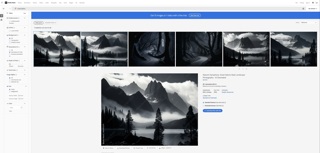Paul Johnson’s Nuclear Nightmare
British historian Paul Johnson imagines the unthinkable, in a December 2002 piece for The Spectator: There arose out of the pit the smoke of a great furnace. (Hat tip: Doss.)
The sound of the explosion was so loud, so prolonged and so unusual that I knew at once I was listening to a historic singularity. Indeed, it may not have been an explosion: more a catastrophic global event. Was it the end of the world? As the initial noise fell in volume, though it did not cease, a pentecostal wind swept over my house in Notting Hill. It faces north into the street, and the air current came from the south, as I could see from the trees bending over in our south-facing garden. I was sitting in my library, in my habitual chair near the French windows, and was astonished to see fallen leaves plastered on to them and held there by the fierce wind. Then I felt movement. It was not like an earthquake, which I had experienced in South America. In such tremors parts of the earth’s crust crack and move in relation to each other, to produce disorientation and dizziness. It was, rather, as if the entire earth moved, as a unit, but out of its regular axis.
Despite the feeling of movement, I went to the bottom of the stairs and began to climb them, up to the top floor, where a glass door in my bathroom leads out to a flat roof. It was midday, but I became uneasily conscious that I was ascending not into light but into darkness. There was no disturbance inside the house and the roof door opened easily. But once I stepped outside I knew I was in a different world, and that the constants of the old, familiar one had changed utterly. The noise continued but spasmodically, ranging in its decibels and nature in an erratic and unpredictable fashion. It was now, audibly, the noise of destruction on an immense scale. The wind, too, came in gusts. I feared the wind. I was beginning to fear everything. The light, or rather the comparative absence of light, was sinister. To the north, the sky was blue, yet there was no daylight. The light was thickening. When I glanced south, into central London, I saw why, and I began to get, for the first time, an inkling of what was taking place.
The whole of the southern view was occupied by a dense, swirling, expanding and ascending column of smoke. It was many miles wide and already tens of thousands of feet high. Though five miles distant at its nearest (I guessed), it was moving with great speed, not so much horizontally as vertically. It was punching a colossal hole in the sky, filling it, then finding fresh energy to punch another, so that at intervals the column was encircled by giant haloes, stretching out vast distances into the stratosphere. I could not see the top of the central column. It was covered by one of these haloes, which was now stretching into the northern portion of the sky, so producing that progressive light reduction I had already noticed. I call the column smoke, and some of it was smoke — the result of a giant conflagration — but most of it was dense, throbbing, twisting cloud, white and grey vapour, of the kind emitted by the steam-engines of my childhood but on an unimaginable scale. How had so much water — or whatever it once was — been turned so swiftly into trillions of square yards of foggy miasma, still piling itself up at high speed into the stratosphere and beyond? What incalculable force had done this monstrous thing?
As my eye fell to the bottom of the column, I began to grasp the source of its power. A white incandescence, low by comparison with the column but still perhaps a mile high and 20 or more broad, filled the skyline of the south horizon. Its fiery heat mitigated the gloom caused by the towering cloud above obscuring the sun. As my eyes grew accustomed to looking at this radiant epicentre, I saw that it was composed not only of white-hot elements, but also of fiery red particles, orange and blue flames, shooting heavenwards like the gigantic tongues which leap out of sunspots thousands of miles into space. There were also sporadic flashes of white, caused, I assumed, by continuing detonations on a stupendous scale. The epicentre was spreading steadily; or rather not entirely steadily, for it moved in spurts and formidable leaps, as well as munching and digesting its periphery. It was alive, this prodigious sore or cancer in London’s heart, expanding its frontiers all the time. It had swallowed and vaporised all Westminster, and sucked out the entire contents of the Thames and turned them into thick clouds. It had gone down the river at thousands of miles an hour, engulfed the City and its tall towers, vaporising steel, concrete, glass and water as it punched and thrashed and pounded the streets of massive buildings into nothingness — or, rather, minute particles of its flaming column, surging high into space. Now it was crumpling and atomising St James’s.













